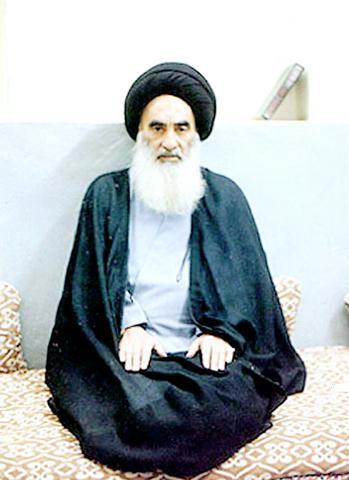A UN mission was due to arrive here yesterday to review demands for imminent direct elections, as Iraq's majority Shiite Muslims gathered for tense weekly prayers one day after their revered spiritual leader escaped an attempted attack.
A source close to the reclusive Ali al-Sistani told reporters that a man was intercepted by bodyguards as he tried to break into the grand ayatollah's office to carry out "a criminal act targeting" the cleric.
The report contradicted TV reports that gunmen sprayed Sistani's car with bullets as he left his office for home, clouding claims that the attack was an outright assassination attempt.

PHOTO: EPA
Sistani escaped unharmed and was being cared for by concerned relatives, Shiite politician Muwaffak al-Rubaie said.
"What I call for now, is for there to be no confessional backlash after this assassination attempt. Instead there should be a national response encompassing all of Iraq," said Rubaie, a member of the US-installed Governing Council.
A Sunni member of the council, mindful of such a backlash against his own minority, which once backed former president Saddam Hussein, immediately denounced the attack on Sistani.
"This horrible act aims only to divide the Iraqi people but it will fail," said Nasir Chaderchi.
In the capital, one US soldier was killed and another wounded in a mortar attack near the airport, bringing to 253 the number of US soldiers killed in action since US President George W. Bush declared major combat over on May 1.
As Shiites prepared to attend tense Friday prayers, UN experts were due to arrive in Baghdad to assess the possibility of holding polls to elect the members of a transitional Iraqi government due to be installed by June 30.
Sistani has been the driving force behind such demands.
Asked whether this insistence could have been behind the assassination attempt, Chaderchi said: "Everyone wants elections in Iraq, some want them before the transfer of power and some after."
UN Secretary-General Kofi Annan ordered the mission at the request of the US-led coalition after it failed to broker a compromise deal to maintain its tight timetable for the handover of power.
Shiites, long repressed under the rule of Saddam Hussein, want direct elections to properly reflect their demographic weight, sending tremors of worry through the country's minority Sunni, Turcomen and Kurdish communities.
Sistani's criticism of coalition plans to hand power to a provisional government selected by provincial caucuses is backed by the rest of the clerical hierarchy as well as the main Shiite religious parties.
The UN evaluators -- the first full-scale mission to Iraq since international staff were evacuated after a deadly bombing last year -- are expected to stay for about 10 days.
But bloody violence continued on Thursday when two young Iraqis, accused by insurgents of collaborating with US troops, were shot dead by masked men in the flashpoint town of Fallujah, west of Baghdad, their relatives said.
Saadun Shukr and Mustafa Zoubai, both 25, were unemployed.
Flyers distributed by masked men in the city after the killings announced that "two master spies who were denouncing the sons of Fallujah have been shot dead."
The leaflets were signed the "Mujahidin," or holy warriors.

A fire caused by a burst gas pipe yesterday spread to several homes and sent a fireball soaring into the sky outside Malaysia’s largest city, injuring more than 100 people. The towering inferno near a gas station in Putra Heights outside Kuala Lumpur was visible for kilometers and lasted for several hours. It happened during a public holiday as Muslims, who are the majority in Malaysia, celebrate the second day of Eid al-Fitr. National oil company Petronas said the fire started at one of its gas pipelines at 8:10am and the affected pipeline was later isolated. Disaster management officials said shutting the

US Vice President J.D. Vance on Friday accused Denmark of not having done enough to protect Greenland, when he visited the strategically placed and resource-rich Danish territory coveted by US President Donald Trump. Vance made his comment during a trip to the Pituffik Space Base in northwestern Greenland, a visit viewed by Copenhagen and Nuuk as a provocation. “Our message to Denmark is very simple: You have not done a good job by the people of Greenland,” Vance told a news conference. “You have under-invested in the people of Greenland, and you have under-invested in the security architecture of this

Japan unveiled a plan on Thursday to evacuate around 120,000 residents and tourists from its southern islets near Taiwan within six days in the event of an “emergency”. The plan was put together as “the security situation surrounding our nation grows severe” and with an “emergency” in mind, the government’s crisis management office said. Exactly what that emergency might be was left unspecified in the plan but it envisages the evacuation of around 120,000 people in five Japanese islets close to Taiwan. China claims Taiwan as part of its territory and has stepped up military pressure in recent years, including

UNREST: The authorities in Turkey arrested 13 Turkish journalists in five days, deported a BBC correspondent and on Thursday arrested a reporter from Sweden Waving flags and chanting slogans, many hundreds of thousands of anti-government demonstrators on Saturday rallied in Istanbul, Turkey, in defence of democracy after the arrest of Istanbul Mayor Ekrem Imamoglu which sparked Turkey’s worst street unrest in more than a decade. Under a cloudless blue sky, vast crowds gathered in Maltepe on the Asian side of Turkey’s biggest city on the eve of the Eid al-Fitr celebration which started yesterday, marking the end of Ramadan. Ozgur Ozel, chairman of the main opposition Republican People’s Party (CHP), which organized the rally, said there were 2.2 million people in the crowd, but